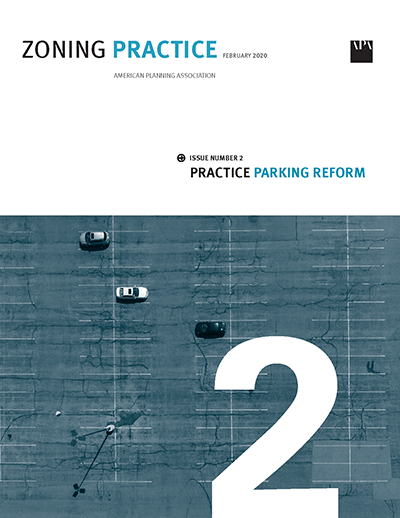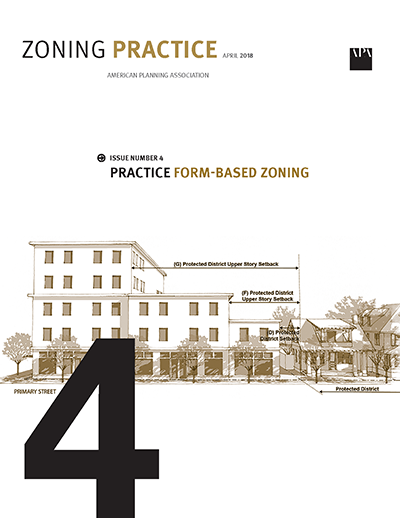Looking for education on this topic?
Check Out Our Passport Courses
Passport is your ticket to the training, experiences, and connections that will take you where you want to go in your planning career. Subscribe for unlimited access for one year to APA's extensive learning library of solution-oriented content facilitated by planners, for planners.
-
Oxnard, CA, 2030 General Plan
Adopted September 2011The city's general plan includes multiple goals encouraging renewable energy generation. -
Newark, CA, General Plan
Adopted December 2013This city's comprehensive plan belongs to the Age-Friendly Communities, Built Environment and Health, Comprehensive Planning, and Historic Preservation collections. -
Carbondale, CO, Municipal Code
Updated March 2019by: Town of CarbondaleThe town's municipal code permit solar energy systems, protect solar access, and incentivizes residential solar development. -
Calimesa, CA, Municipal Code
Updated August 2018by: City of Calimesa, CAThis regulation belongs to the Outdoor Lighting and Solar Energy collections. -
Enfield, CT, Town Code
Updated April 2019The town's zoning code includes special regulations for small and large solar energy systems and addresses the appropriateness of solar on historic buildings. -
Hermosa Beach, CA, Municipal Code
Adopted June 2019This regulation belongs to the Green Stormwater Infrastructure and Solar Energy collections. -
Bellevue, WA, City Code
2017The city's land-use code regulates developments near environmentally sensitive areas, installation of wireless facilities in the public right-of-way, and transit oriented development. -
Blaine County, ID, County Code
Updated October 2023The county's code encourages the use of accessory solar energy systems in all zoning districts and provides solar siting considerations for planned unit development (PUD) proposals. -
Marin County, CA, Countywide Plan
Adopted 2007, amended through 2013The countywide plan includes policies that promote food systems and solar energy. -
Glenwood Springs, CO, Municipal Code
Updated June 7, 2018This regulation belongs to the Outdoor Lighting and Residential Infill Development collections. -
Fayetteville, AR, Code of Ordinances
Updated November 2019This regulation belongs to the Accessory Dwelling Units, Green Stormwater Infrastructure, and Rethinking Off-Street Parking Requirements collections. -
Boise, ID, City Code
Adopted November 2011This regulation belongs to the Accessory Dwelling Units, Food Trucks, Green Building, and Small Wireless Facilities and Wireless Facilities in the ROW collections. -
When Driving is Not an Option
It’s time to recognize and listen to the 25 percent of the U.S. population that doesn’t drive, says author Anna Letitia Zivarts.by: Steve Wright September 05, 2024It’s time to recognize and listen to the 25 percent of the U.S. population that doesn’t drive, says author Anna Letitia Zivarts. -
A Decade After Disaster
When a tsunami left Japan’s coastal Tōhoku region devastated, the country prioritized concrete and local control. Ten years later, planners take stock of recovery.by: Michael Fitzpatrick June 01, 2021When a tsunami left Japan’s coastal Tōhoku region devastated, the country prioritized concrete and local control. Ten years later, planners take stock of recovery. -
Complete Streets Drive Housing, Jobs, and Retail Gains
A new study finds measurable economic benefits beyond the aesthetics, traffic calming, and pedestrian and bicyclist safety they already are known for.by: Arthur Nelson, FAICP August 01, 2024A new study finds measurable economic benefits beyond the aesthetics, traffic calming, and pedestrian and bicyclist safety they already are known for. -
Online Dissent: Fostering a Necessary Component to Planning
by: Mike LidwinUncovering JAPA: How can planners preserve dissent in online public engagement opportunities? -
Celebrating the Wilderness Act of 1964
October 01, 2014This article discusses the 50th anniversary of the Wilderness Act of 1964 and its accomplishments, which includes establishing important safeguards for the protection and development of some of the nation's most impressive wild areas. -
4 Steps to Creating Inclusive, Anti-Racist Third Spaces
Help community connections flourish.December 01, 2020Four tips for defining and designing public outdoor third places to be intentionally inclusive, community driven, and anti-racist. -
The Pseudoscience of Parking Requirements
Zoning Practice — February 2020by: Donald Shoup, FAICP February 01, 2020This edition of Zoning Practice summarizes the social, economic, and environmental costs of minimum off-street parking requirements and explains how removing parking minimums can translate into community benefits.List price$10.00ZP subscriber$0.00 -
Supporting Active Living Through Mixed-Use Developments
by: Johamary Pena, AICP, Sagar Shah, PhD, AICPThis blog post provides an overview of mixed-use development as a planning approach to increase physical activity in small and rural communities through everyday destinations. It is part of the Everyday Destinations series. -
Urban Heat Resilience
PAS QuickNotes 95by: Ladd Keith, Sara MeerowThis edition of PAS QuickNotes explains national trends in extreme heat and describes how planners can enhance urban heat resilience for their communities through planning and implementing heat mitigation and management strategies.Nonmember price$10.00APA members & PAS subscribers$0.00 -
Planning Beyond the Bike Lane
January 01, 2017City officials and planners need to take a hard look at bicycling's mode share as a metric, set a reasonable target, and develop more holistic strategies to get there. -
Green Space Improvements Promote Destination Connectivity
by: Johamary Pena, AICP, Sagar Shah, PhD, AICPThis blog post provides an overview of creative placemaking as a planning approach to increase physical activity in small and rural communities through everyday destinations. It is part of the Everyday Destinations series. -
Preparing for the Next Big One
Places that put 'resilience' in their future.August 01, 2015The importance of resilience to disaster management has grown in recent years. -
Using Public Space to Expand Storytelling on the National Mall
New exhibit aims to increase representation by telling important stories of the nation.by: Dina WaltersA new temporary exhibit on the National Mall aims to balance protecting historic spaces while increasing opportunities for more stories to be shared. -
Creativity Follows Catastrophe
January 01, 2014Local, resident-driven efforts are reimagining Christchurch, New Zealand, following a 2010 earthquake. -
Deregulating Parking
by: Grant Holub-MoormanUncovering JAPA: Learn how Champaign, Illinois, has combated onsite parking constraints by removing minimum parking requirements and improving the utilization of existing parking. -
Charlotte, NC, Unified Development Ordinance
Updated June 2024This regulation belongs to the Active Transportation, Food Trucks, Group Housing, Hazard Mitigation, Housing Supply Planning, Transit-Oriented Development, Tree Preservation and the Urban Forest, and Zoning Reform and Code Writing collections. -
How Can Carshare Help Low-Income Travelers?
by: Grant Holub-MoormanUncovering JAPA: Carshare programs can benefit low-income travelers but there remain some challenges that need to be addressed. -
Beyond Stormwater
Capturing the unrealized potential of green infrastructure systems to solve 21st century challenges.August 01, 2020Conceptualizing green infrastructure as a comprehensive approach to designing the built environment that promotes — not just conserves — ecosystem services in an equitable manner can promote many benefits for our communities. -
Living with Your Form-Based Code
Zoning Practice — April 2018by: Nancy Stroud, FAICP, Elizabeth Garvin, AICP April 01, 2018This issue of Zoning Practice focuses on preparing for and living with the day-to-day administration of a form-based zoning code, including educating and training stakeholders, resolving conflicts in the development review process, and adjusting the new code as necessary and appropriate.List price$10.00ZP subscriber$0.00 -
UPDATE: SCOTUS Case Doesn't Upend Sign Regulations
by: Brian ConnollyThe U.S. Supreme Court ruled that the City of Austin, Texas' off-premises sign regulations were permissible under the First Amendment. -
3 Essential Tips for Planning with Multilingual Communities
Community engagement experts offer tested approaches that prevent tokenism, create trust, and foster a sense of belonging.by: Rebecca Greenwald June 09, 2023Community engagement experts offer tested approaches that prevent tokenism, create trust, and foster a sense of belonging. -
Petaluma, CA, General Plan
Updated January 2012This comprehensive plan belongs to the Green Building and Solar Energy collections. -
Alachua County, FL, Comprehensive Plan 2019-2040
Adopted 2019This county's comprehensive plan belongs to the Built Environment and Health, Capital Improvements Programming, Comprehensive Planning, Food Systems, and Solar Energy collections. -
Boston, MA, Zoning Code
Updated March 2022This regulation belongs to the Climate Change, Green Building, Hazard Mitigation, Shared Mobility, and Urban Agriculture collections. -
Olathe, KS, Municipal Code
Updated August 2020These regulations belong to the Housing Supply Planning, Solar Energy, Transit-Oriented Development, and Zoning Reform and Code Writing collections. -
Brevard County, FL, Code of Ordinances
Updated February 2020These regulations belong to the Affordable Housing Programs, Housing Supply Planning, Inclusionary Housing, and Tiny Houses and Micro-Apartments collections. -
Redmond, WA, Zoning Code
Updated March 2019This regulation belongs to the Active Transportation, Green Building, Green Stormwater Infrastructure, Inclusionary Housing, and Outdoor Lighting collections. -
Visual Guide to Agrivoltaics and Wildlife-Friendly Solar
by: Alexsandra GomezAgrivoltaics — or the placement of a solar energy system on the same parcel of land as agricultural production — and wildlife-friendly solar practices can help communities capture multiple benefits from large-scale solar development. -
Practice Gentle Density
Zoning Practice — February 2023This issue of Zoning Practice explores zoning strategies that balance the concerns of residents and the demands of the housing market by accommodating gentle density increases in a context-sensitive manner. From historic downtown neighborhoods to modern residential subdivisions, the tools presented can be used by planners throughout the country to implement housing policy through regulation. -
Santa Clarita, CA, General Plan
This comprehensive plan includes a number of goals, objectives, and policies addressing solar energy and supporting its use in project development.Santa Clarita, CA -
Redwood City, CA, General Plan
The Natural Resources Element of the city's general plan includes policies and implementation programs to promote renewable energy use and encourage on-site solar energy production.Redwood City, CA -
St. Lucie County, FL, Land Development Code
Updated May 2018The county permits solar energy systems as accessory uses in all districts and allows primary-use solar generation stations as conditional uses in agricultural and utility districts; standards are provided. The county’s zoning code includes a mapped mandatory form-based overlay zone. -
Mason City, IA, City Code
Updated December 2018by: City of Mason City Cmty Dev DeptThese regulations belong to the Solar Energy and Wind Energy collections. -
Iron County, UT, Code of Ordinances
Updated December 2018These regulations belong to the Solar Energy and Wind Energy collections. -
Babylon, NY, Town Code
Updated February 2019This regulation belongs to the Age-Friendly Communities, Form-Based Zoning, Green Building, and Transit-Oriented Development collections. -
Brookhaven Town, NY, Municipal Code
Updated July 2019The town's municipal code permits accessory solar energy systems in all districts by right and principal-use solar facilities on certain lands with special permit approval. -
Biloxi, MS, Land Development Ordinance
Updated September 2019This regulation belongs to the Green Stormwater Infrastructure and Solar Energy collections. -
El Paso, TX, Municipal Code
Updated November 2019This regulation belongs to the Active Transportation, Green Stormwater Infrastructure, Outdoor Lighting, and Solar Energy collections.









